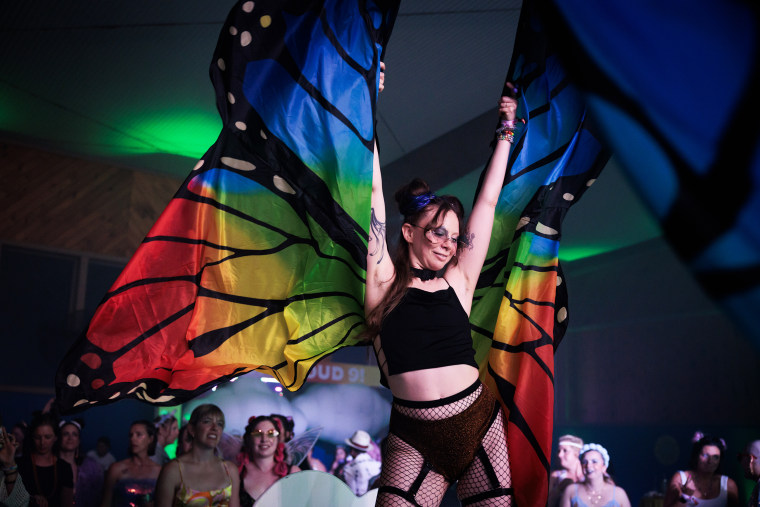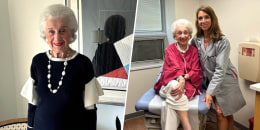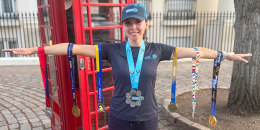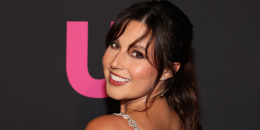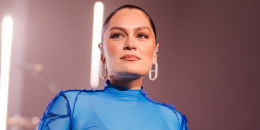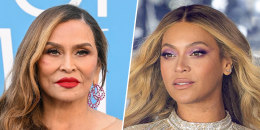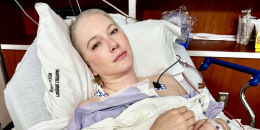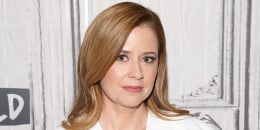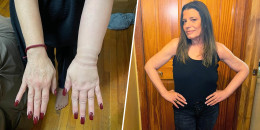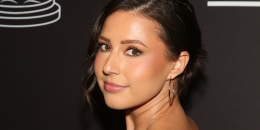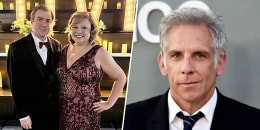The sun peeked through hazy clouds as 20 bathing suit-clad women held hands at the edge of a dock at 8 in the morning.
Someone shouted instructions: On the count of five, they would jump into the lake at Camp Bryn Mawr in Honesdale, Pennsylvania. The cold plunge has become somewhat of a right of passage for many attending Camp Breastie.
After the jump, as their heads bobbed above water, Paige More, one of the co-founders of support group The Breasties, declared that "this is the best lake" so far — it was the camp's fourth year but the first time at this location.
Three more groups jumped into the lake, some people plunging more than once. As everyone shivered, wrapped in their towels on the shore, the energy felt jubilant. People hugged and swapped stories, catching up about the prior year.
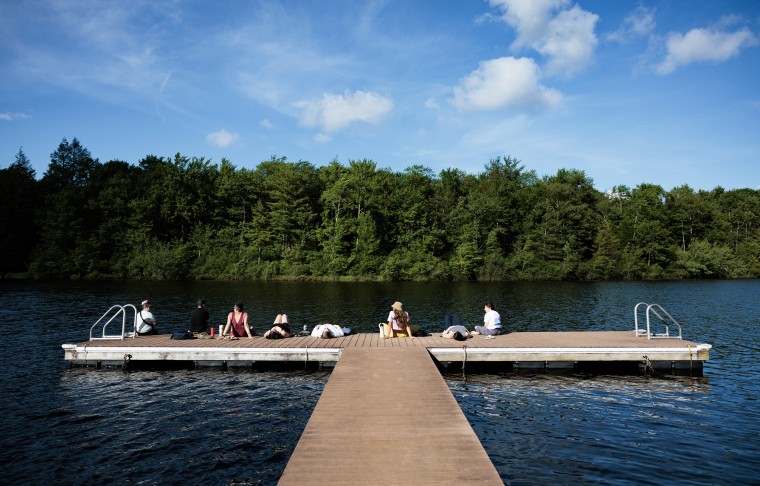
Camp Breastie provides people affected by breast and gynecological cancers, aka Breasties, a glamping experience along with panels of doctors and researchers; the opportunity to connect with others with similar stories; and more traditional fun camp experiences, like archery, friendship bracelets, open-mic nights and dancing for hours at the final party, the Breastival.
“It is truly unlike anything I’ve seen for patients. It’s everyone together — survivors, people with metastatic cancer, caregivers,” Dr. Elisabeth Potter, a reconstructive breast surgeon from Texas, who participated in several panels, tells TODAY.com. “This place is extremely caring. It’s over-the-top catered around the camper.”
For some, the pressure to be a certain type of cancer patient can feel overwhelming. In panels, some Breasties talked about feeling obligated to be strong or "a warrior" at home. Others mention projecting optimism to help friends and family feel better.
“You are fighting the world to put on this brave face because you still have to still go to work and show up for people,” Trish Michelle, chief community officer of The Breasties, said during the opening night campfire. “That dance is so exhausting. Folks don't understand.”
Attending camp allows Breasties to just be themselves without judgment.
“There’s no pity,” Potter says. “They can say what they want to say and not worry that their kid or spouse or sister is going to hear something that makes them sad. They can unload here.”
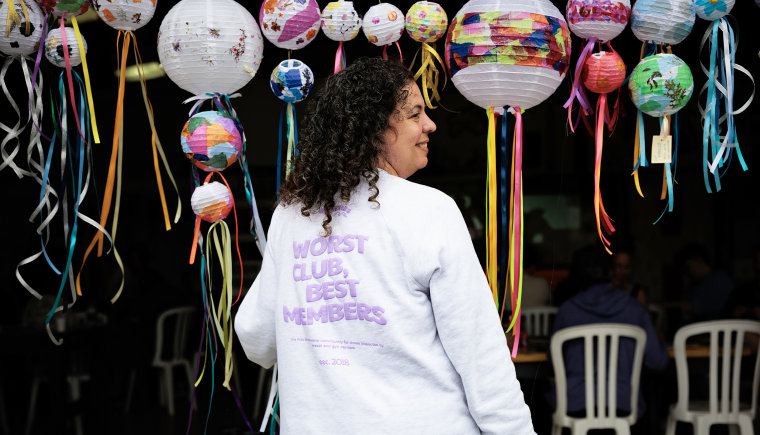
As cancer in young people increases, a new type of support is needed
Over the past decade, certain cancers have become more common in young people.
Rates of breast cancer in women under 50 grew by 1.4% every year from 2012 to 2021 (compared to 0.7% annually in women over 50), according to the American Cancer Society. Similarly, cervical cancer diagnoses in women ages 30-44 increased 1.7% every year from 2012-2019.
While the reason for this shift isn't clear, what is known is young patients and survivors have different needs from older people with cancer, from fertility preservation to financial support and help navigating long-term effects of treatment — which, thanks to research advancements, can keep people alive for decades.
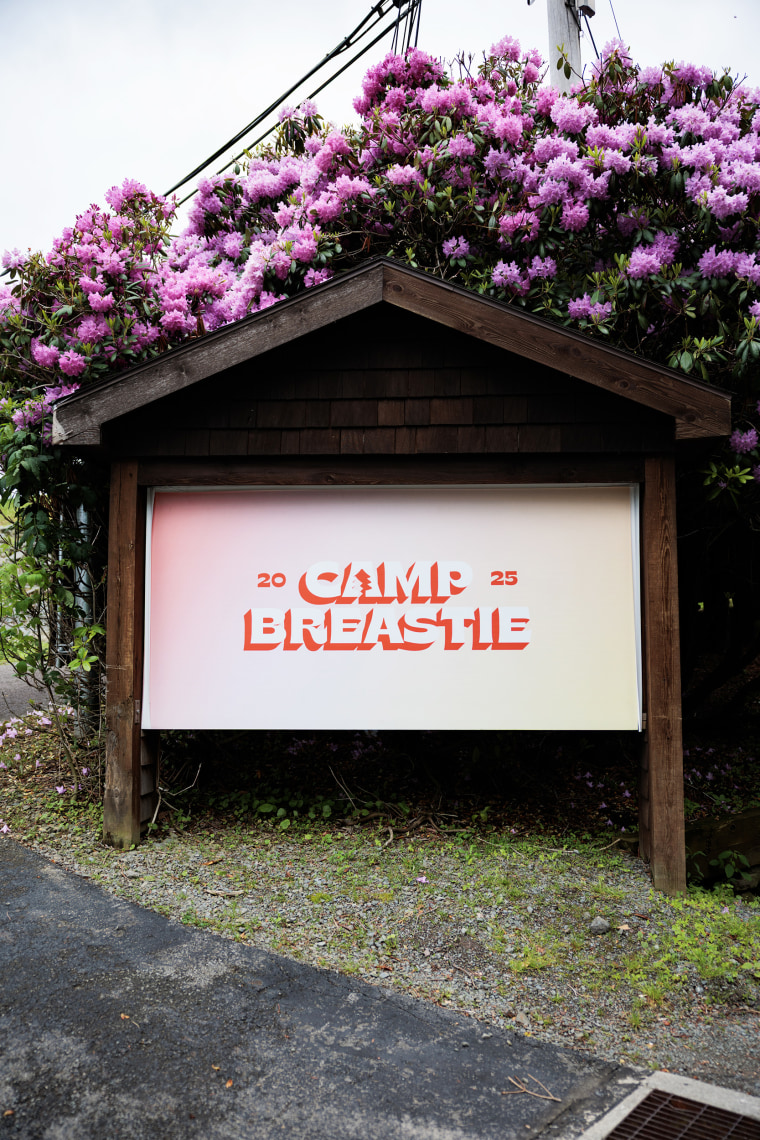
And then there's mental impact of confronting your mortality at such a young age.
“This age group faces unique emotional and psychological challenges, including disruptions to their education, career, social relationships and future planning,” Ola Abdelhadi, a postdoctoral researcher at the University of California Berkely School of Public Health, told the American Psychological Association, in 2024.
“The emotional toll and the need for specialized mental health support are frequently underreported.”
Recent research shows young adults who had cancer are at greater risk of mental health conditions. A meta-analysis of 52 studies published in JAMA Pediatrics in 2023 found that children, adolescents and young adults with cancer faced an increased risk of depression, anxiety and psychotic disorders compared to peers without cancer.
Many young people who join local support groups find they're the youngest person there. When More learned in 2017 that she had a genetic mutation to her BRCA1 gene, which greatly increases the risk of developing breast cancer, she struggled to meet anyone her age who was also a "previvor."
Learn the Lingo
- The Breasties: name of the nonprofit for people impacted by breast and gynecological cancers, which hosts Camp Breastie.
- A Breastie: a member of The Breasties, which includes people with cancer, caregivers and survivors.
- Previvor: someone with a known genetic mutation that increases cancer risk but has not yet been diagnosed.
- Thriver: a person with Stage 4 or metastatic cancer, which has spread throughout the body. Current treatments cannot cure Stage 4 cancer, but they can extend people’s lives.
- Flattie: a person who undergoes a mastectomy but does not opt for breast reconstruction.
- BRCA1 or BRCA2 mutation: An inherited change to a tumor-suppressing gene that makes work it improperly and can lead to breast or ovarian cancer.
Meeting after meeting with Styrofoam plates of Chex Mix eventually encouraged More and the others to build a new organization.
“If we can’t find what we so desperately need, maybe we create it,” More recalled during her Camp Breastie opening speech. “Nobody in the world deserves this more than you.”
For recently diagnosed young people with breast and gynecological cancers, finding the Breaties makes undergoing treatment and survivorship feel less isolating.
“These people just get me. I saw myself,” Lindsey Baker, 40, who was diagnosed with Stage 2 breast cancer in 2020, tells TODAY.com. “It felt safe.”
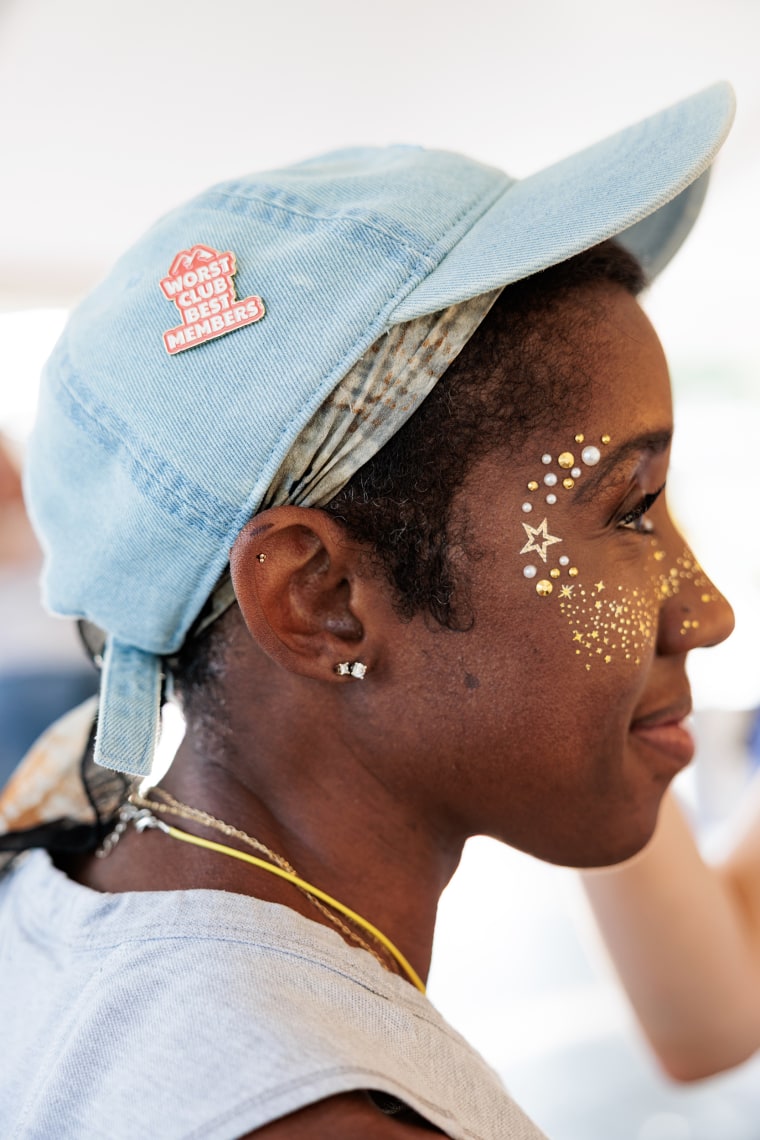
The Worst Club With the Best Members
Whitney Houston’s “I Wanna Dance with Somebody” blasted over the loudspeaker, and 600 campers danced and belted out the lyrics as they filed into the pavilion for the opening ceremony. Camp Breastie 2025’s theme is "Breastie Dreamland," which co-founder Allie Brumel explained after the spontaneous dance party ended.
“When cancer touches your life, it feels like you can’t dream anymore,” she says. “We wanted Camp Breastie — Breastie Dreamland — to be a place where you have permission to dream again.”
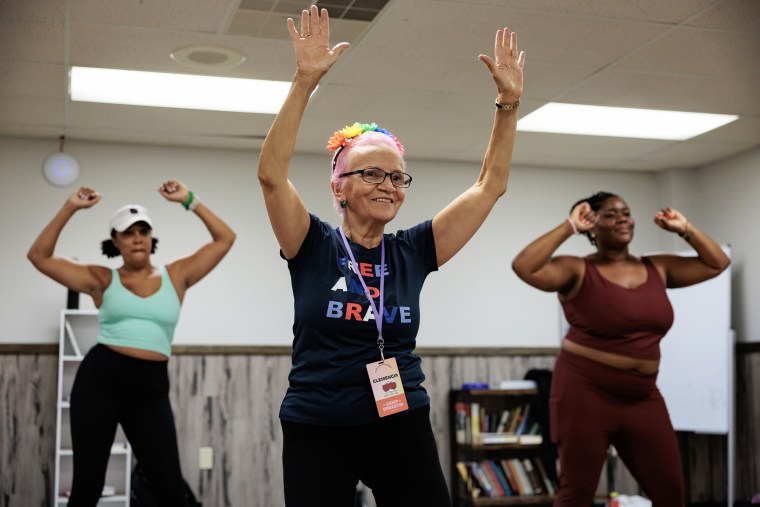
Over four days, certain phrases echo throughout camp, such as “the worst club with the best members,” and “our community is our North Star.” Breasties lift one another up and offer a type of understanding that can be tough for young cancer patients, survivors and previvors to find in real life.
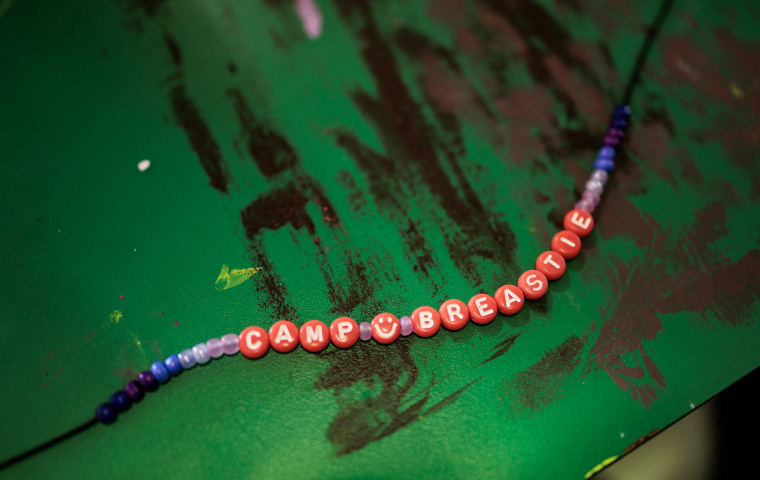
For Baker, finding The Breasties helped her navigate her treatment and survivorship.
“I’m a triple-negative breast cancer survivor and research is why I am here,” Baker says. “The Breasties gave me community — and also saved my mental health.”
When she was first diagnosed, she connected with a breast cancer support group in Tucson. The women, who were “lovely,” were in their 60s and 70s, and their concerns differed from Baker’s.
“I did not feel seen,” she says. “It was like, ‘How can I talk about trying to date again after a double mastectomy? How do you write that in your app (bio)? Do you bring it up on a second date?’”
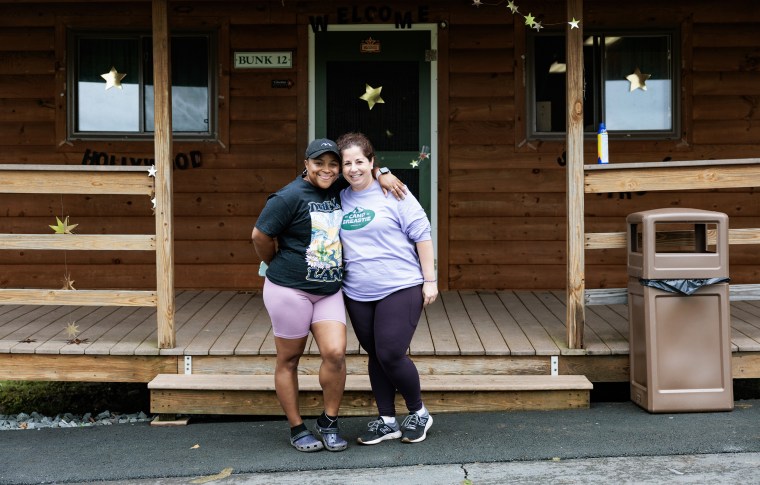
This was the third time Baker has attended Camp Breastie, where she's served as a cabin leader every year. This year, she also helped oversee all the other cabin leaders. When she first attended in 2023, she met Melary Cruz, who was assigned to her cabin, and an unexpected friendship blossomed.
“On paper, we were really different,” Baker says. “But we had the same diagnosis.”
After a panel on intimacy and relationship, the two began an emotional chat.
“We had the most vulnerable conversation about what does it mean to be physically and sexually active post-cancer, and how do we show up as women,” Baker says. “The Breasties created that space.”
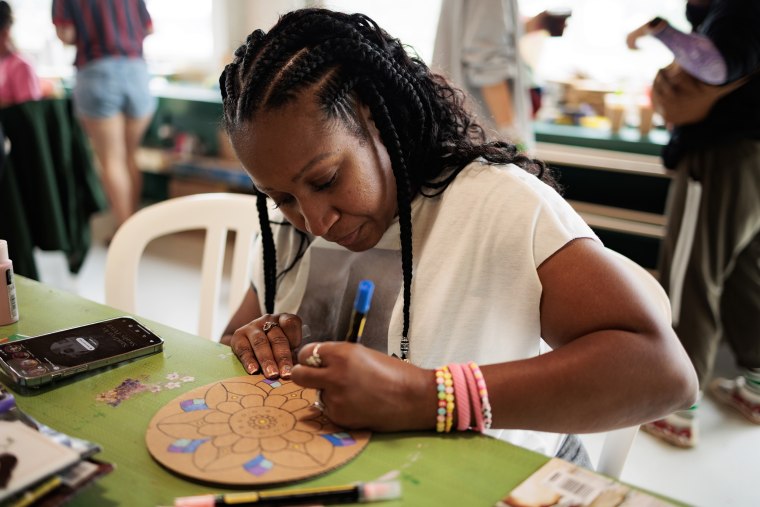
Cruz, who was diagnosed with Stage 3 triple-negative breast cancer with a BRCA 2 mutation when she was 26, was juggling a career in health care and twin daughters when she learned she had cancer. At the time, she didn’t know anyone with cancer, especially not her age.
“I remember being online, scared, thinking only elderly folks really got cancer,” Cruz, now 33, of Massachusetts, tells TODAY.com. “I was feeling really isolated.”
After being diagnosed in 2020, she discovered The Breasties.
“As an Afro-Latina, I wanted something that was very diverse or that spoke really to my roots,” she says. “This was (a group of) people who are either in the same journey or have been there.”
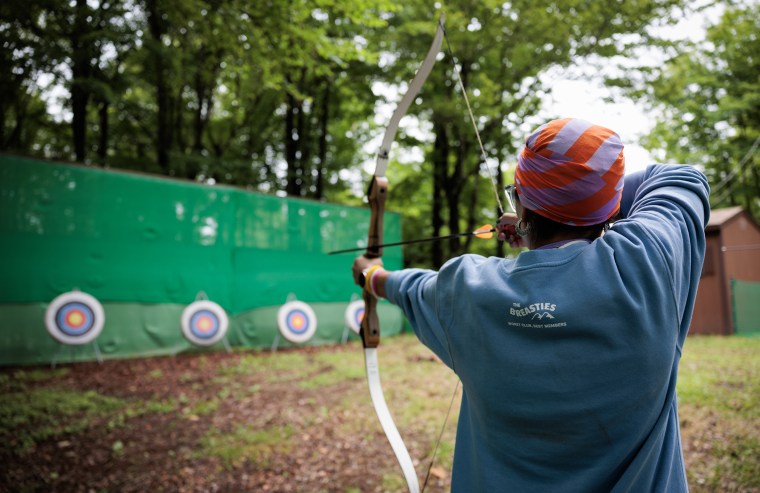
Her first year at camp, Cruz learned so much about her diagnosis that she hadn’t heard from her doctors. This helped her become a better advocate for herself. She hopes she can provide the same support she received from The Breasties to others.
“I want to be that person for 26-year-old me, who didn’t have that person, and let them know, ‘Hey, these are the things you can ask (for),’” she says.
Hearing other people’s stories feels powerful for many campers. Elizabeth Rainey participated in a panel about mental health and intimacy after a cancer diagnosis. Afterward, a woman who'd found Rainey online before camp tearfully embraced and thanked her for sharing her story of being a Stage 4 metastatic breast cancer “thriver.”
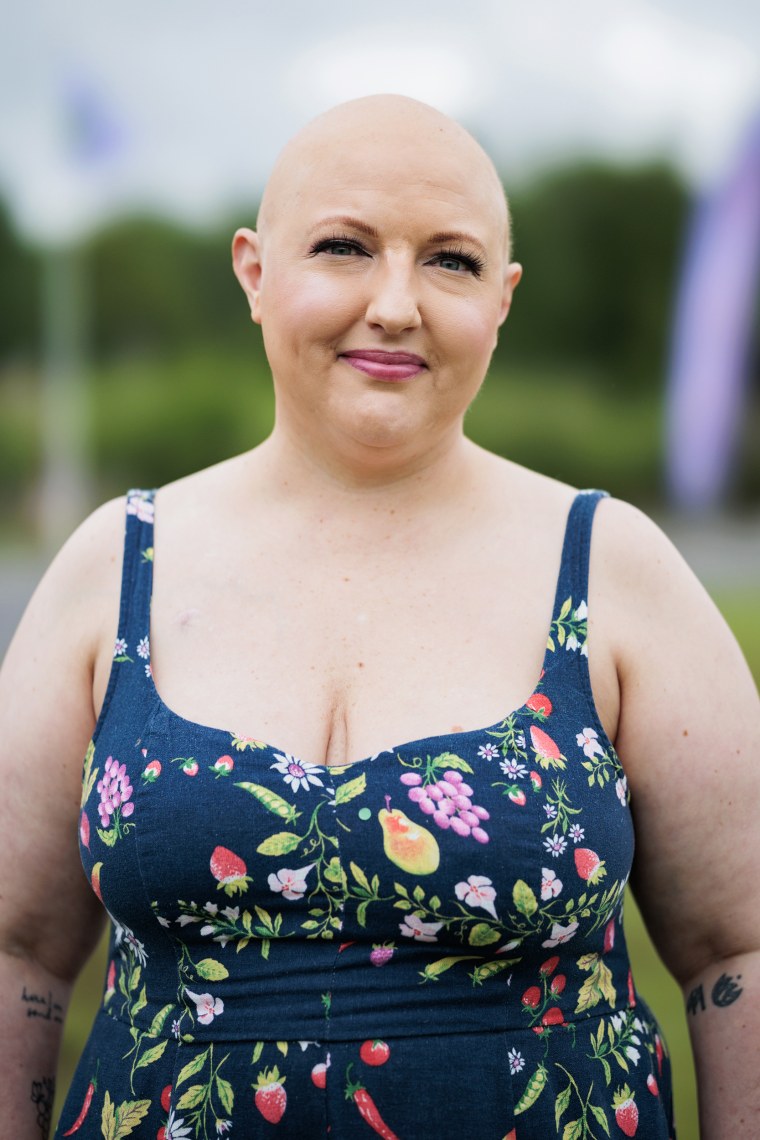
“I was the first person she found on Instagram when she was diagnosed,” Rainey, 40, of Oxford, Mississippi, tells TODAY.com. “That’s the highlight of my life — to know that I was there for someone else.”
Rainey was 36 when she learned she had breast cancer, which doctors originally said was Stage 1. After she advocated for a PET scan, she learned she had Stage 4 invasive ductal cell carcinoma that’s estrogen positive with “hundreds” of metastases on her liver. Suddenly, everything changed.
“They told me that there was no point in me having surgery because the cancer had spread to other parts of my body, which was hard for me to wrap my mind around,” she says. “That was the first time I knew the gravity of the situation and the fact that this was a terminal illness.”
In tiny Oxford, Rainey had never met anyone with Stage 4 cancer. Last year, she attended her first Camp Breastie.
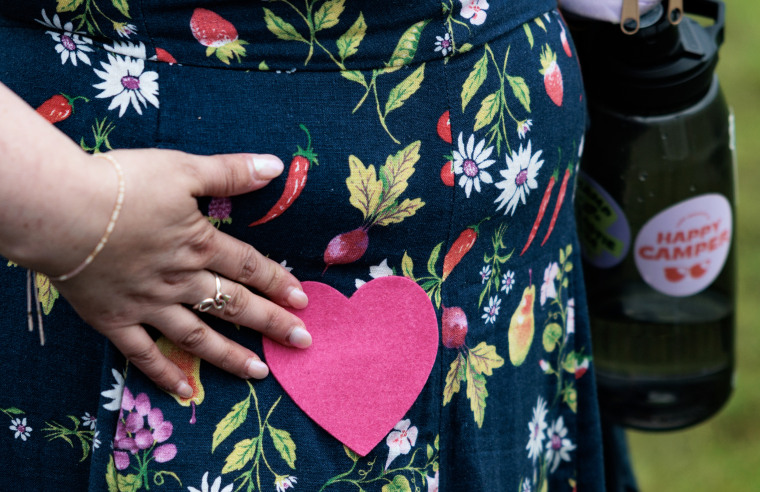
“The Breasties brought me a community of people that were like me, that saw me for who I was, that I could be my true and authentic self and feel like I belonged,” she says. “There’s nothing that can replace that feeling of belonging and community.”
Rainey notes that thrivers are the “pink elephant in the room,” because a Stage 4 diagnosis is “scary.” Still, fellow Breasties embrace them and allow them to have space.
“Living with cancer long term until it ultimately takes your life is a different set of worries and concerns and a different way to lead your life,” she says. “The Stage 4 diagnosis, the dying from cancer, there’s a large group of us that are dealing with that and do need to talk about it.”
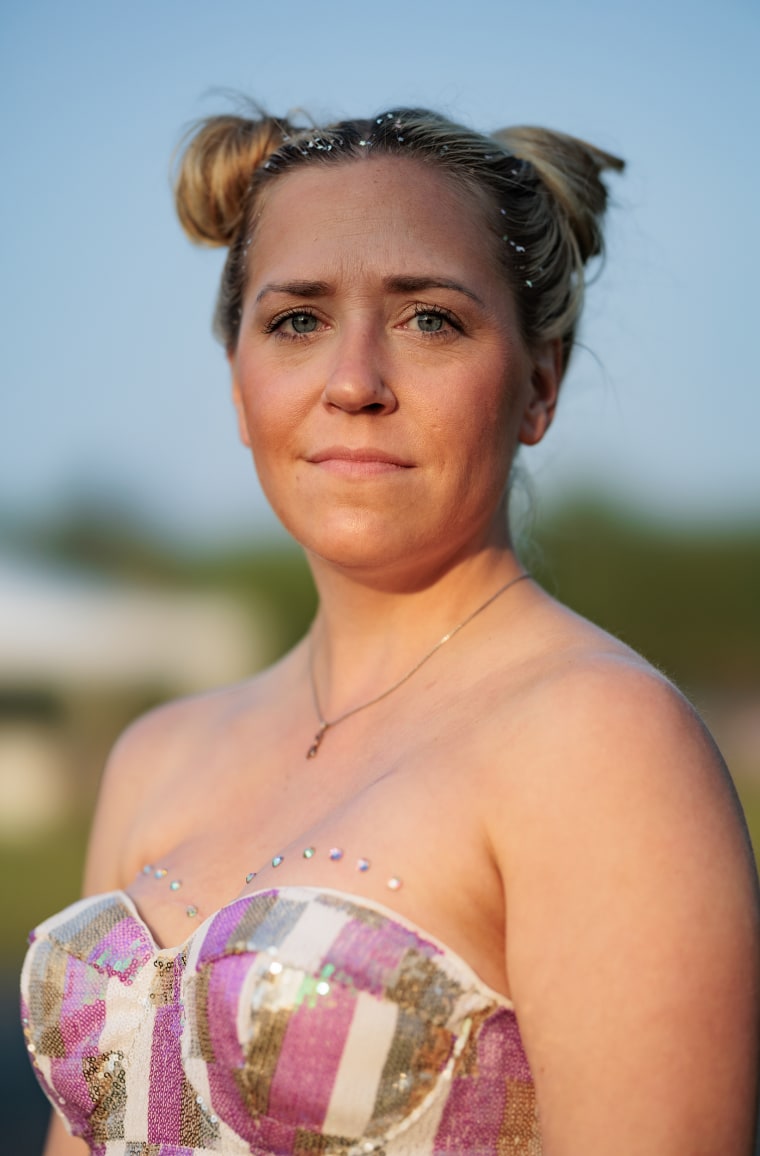
When Brooke Schneider was diagnosed with Stage 2 triple-negative breast cancer in 2021, she was five months pregnant.
“I was like, ‘This is insane. There’s no way a 31-year-old pregnant person has ever been diagnosed with cancer before,’” the now 33-year-old from Phoenixville, Pennsylvania, recalls to TODAY.com.
After she discovered The Breasties, Schneider connected with a woman from Florida named Julie, who was diagnosed with the same type of cancer during pregnancy in the same year.
“We just get each other,” Schneider says. “It was great. I was talking with her and some of her cabin mates and just talking about how we can’t get our kids to eat food all the time. And what we do to keep them busy. Normal mom things.”
Tiffany Kindred, 39, of Atlanta, was also diagnosed with cancer — Stage 1 ovarian — during pregnancy after an ultrasound detected a mass. This year was her second time at Camp Breastie and her first as cabin leader.
Kindred's sister, Kellie Goss, head of The Breasties’ diversity committee and a BRCA 1 previvor, and mom Barbara Kindred, a two-time breast cancer survivor who's on the camp's the mental health support team, also attended.
It "feels great" to be all together at camp, Kindred tells TODAY.com. “My mom has become the camp mom, a camp celebrity, and it has been a really, really amazing experience.”
Catering to the Campers
This was the first year for Breastie TV, a livestream of many of the camp’s events. Camp sold out in 20 hours, so the livestream allowed people who couldn’t make it to catch up at home. The stream was hosted by Victoria Price — an actor and podcaster who had ductal carcinoma in situ, sometimes called Stage 0 breast cancer, and a BRCA2 mutation — and genetic counselor Dena Goldberg, known as Dena DNA on social media. She also offered one-on-one sessions at camp and led a panel.
“It was so satisfying to be here and to be able to be somebody that can help,” she tells TODAY.com. “It was so amazing to be with those other people who are so passionate about this community.”
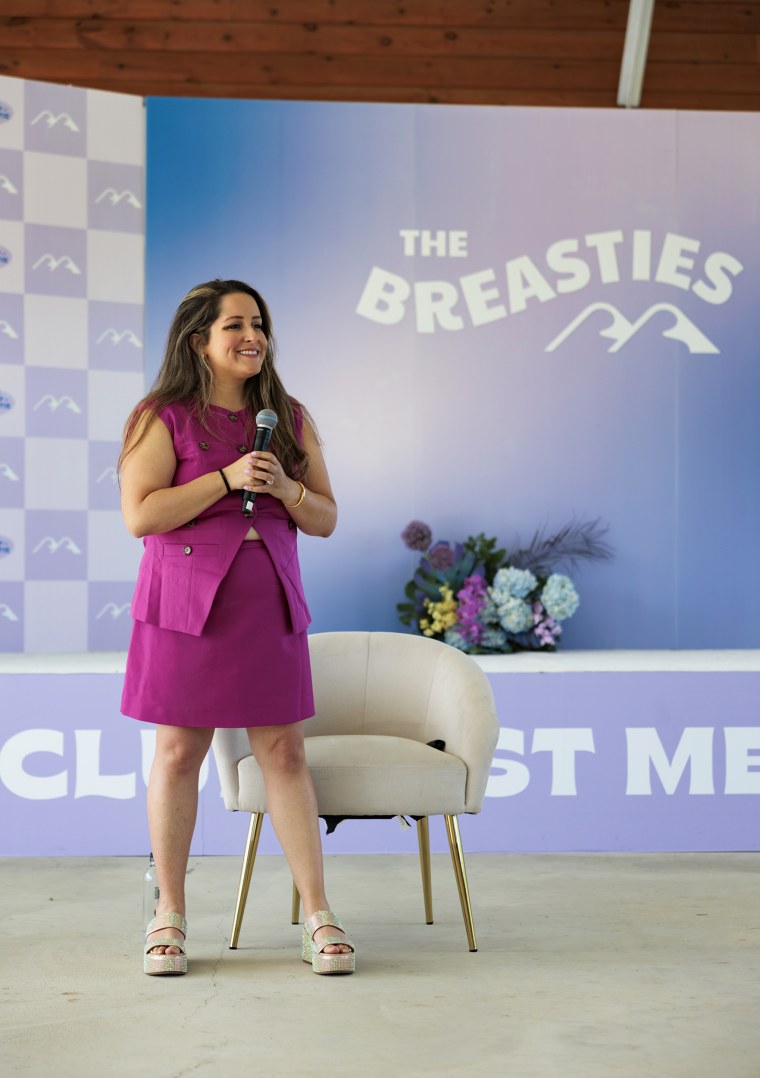
Potter, the breast reconstructive surgeon, agrees that Camp Breastie is equally transformative for people who work with breast and gynecological cancer patients as it is for attendees.
“I’m a better surgeon this year than I was last year,” she says. “I’m a deeper person. I have a real appreciation for my patients after being at Camp Breastie.”
And for many campers, having such personal access to doctors makes a huge difference.
“(Potter's social media) videos changed my whole journey,” Joanie Carey, 61, of New York, who was diagnosed with Stage 1 invasive ductal carcinoma in 2023. “She’s had such an impact on me.”
Camp Breastie offers expertise beyond the medical world, too. The founders of Chemo Cuts Collective, which specializes in hair styling for cancer patients, helped get campers ready for the camp's official celebration called Breastival.
Best friends Jennie LeGrady and Mary Sutcliffe founded the group after Sutcliffe was diagnosed with Stage 3 triple-negative breast cancer at 32. LeGrady became Sutcliffe's caregiver and helped cut her hair as it thinned during treatment. When it was time to shave her head altogether, LeGrady was at Sutcliffe’s side.
“It is really beautiful to give other people what I could get,” Sutcliffe tells TODAY.com. Having your hair cut “helps you come to terms” with having cancer, she adds.
The Breastival
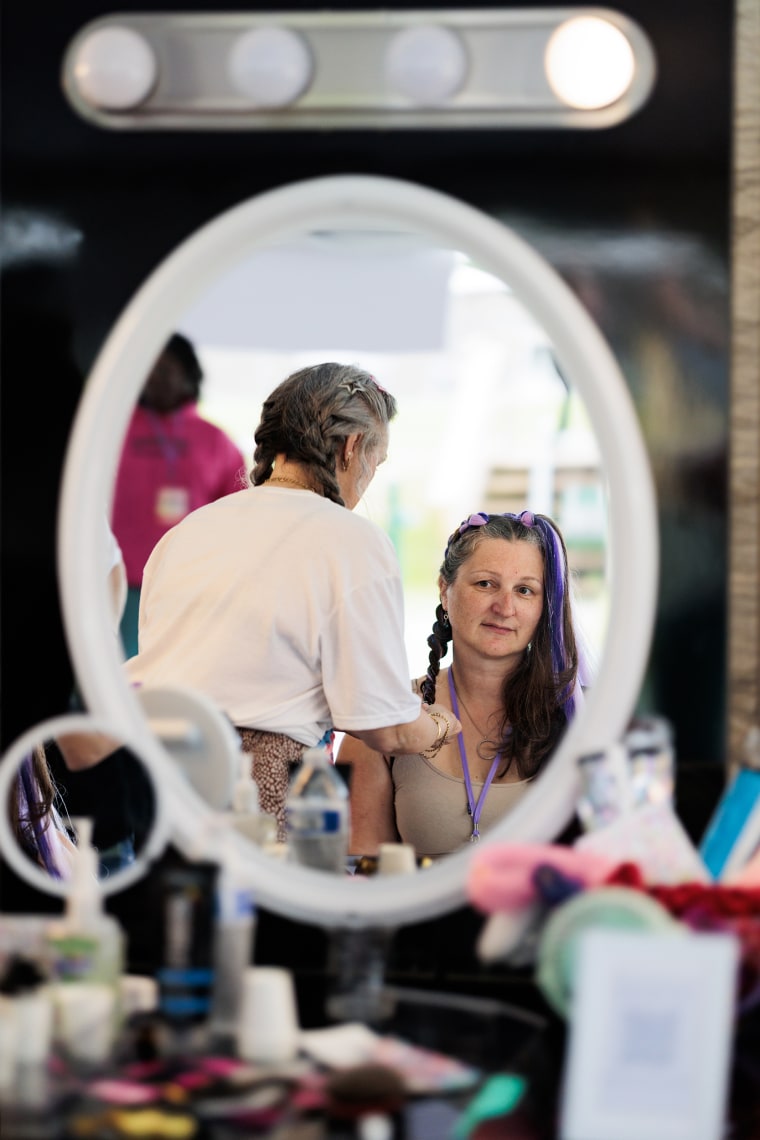
On Saturday, a large white event tent appeared on a tennis court at camp. Ten vanities with mirrors and salon chairs lined the wall as a dozen stylists from Chemo Cuts Collective assisted the campers with their hair for Breastival.
The stylists at Camp Breastie wove colorful extensions into campers’ hair and helped with sweeping updos. To the side of the tent was a table with temporary tattoos, wearable gemstones and decorative nipple covers. Two hours before the party, only one set of nipple covers remained, and soon a woman snagged them for her costume.
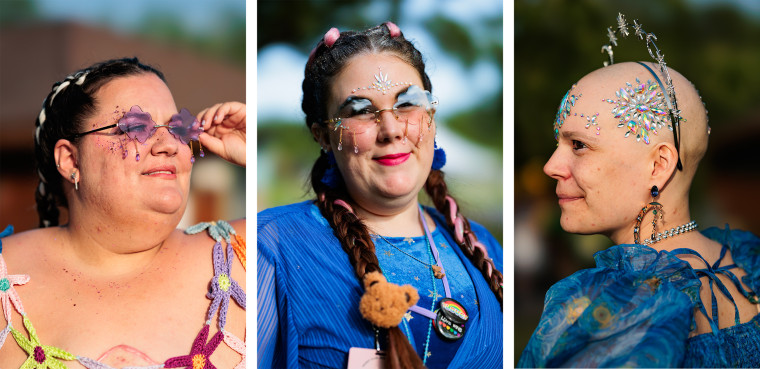
A woman in green gauzy fabric draped over her like a Greek goddess looked for a few extra embellishments for her costume, which she cobbled together as if she were on “Drag Race,” she quipped.
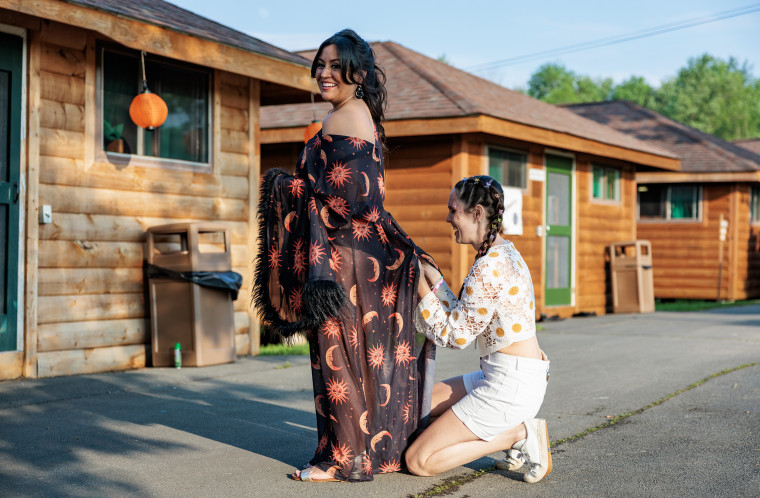
“I love this night so much,” Caralyn Kieper, 37, tells TODAY.com.
She’s not alone. Breastival gives campers a chance to have fun and celebrate in a judgement-free zone. It started with a Pride parade led by the LGBTQ committee. While Breastival is normally held outdoors, rain was forecasted and the event moved inside.
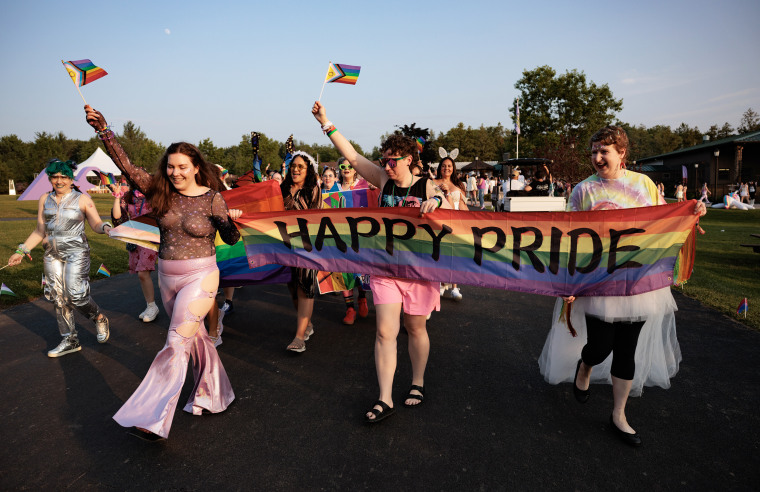
There were as many interpretations of the "Dreamland" theme as there are Breasties.
One woman used pillow stuffing to make a cloud halter top. Others chose corsets and gauzy skirts. Another woman paired her silver corset with iridescent silver wings. There were a dozen variations of butterflies.
The leadership team — which includes Brumel, More, Majsiak and Michelle — dressed in inflatable clouds and stars with Breastie PJs underneath their costumes. Baker wore pink sequins, and Cruz had purple and pink extensions woven into her hair.
Getting ready for Breastival feels like a sleepover or dressing for prom, Baker says, as she steps outside for a breather.
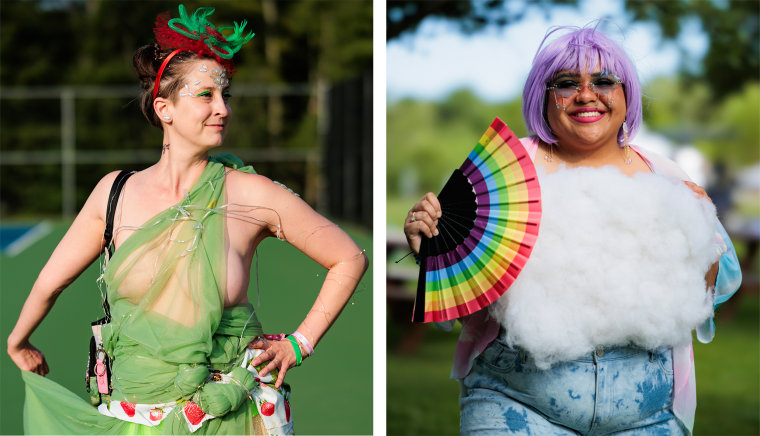
Breastival included food trucks, a bounce house, mini golf, flash tattoos, sitting areas with cushy couches and a catwalk that women jumped up on to dance.
Carey got her first tattoo, a script that reads “strength.” She looks thrilled, scared and impressed with herself. Being at Camp Breastie helped her face emotions of having breast cancer, something she neglected while undergoing treatment.
“I was like ‘Oh my God what happened?’ I never dealt with it. I think I cried only once,” she says. “That was the reason I’m here. I was like, ‘OK, you got to find your community.’”
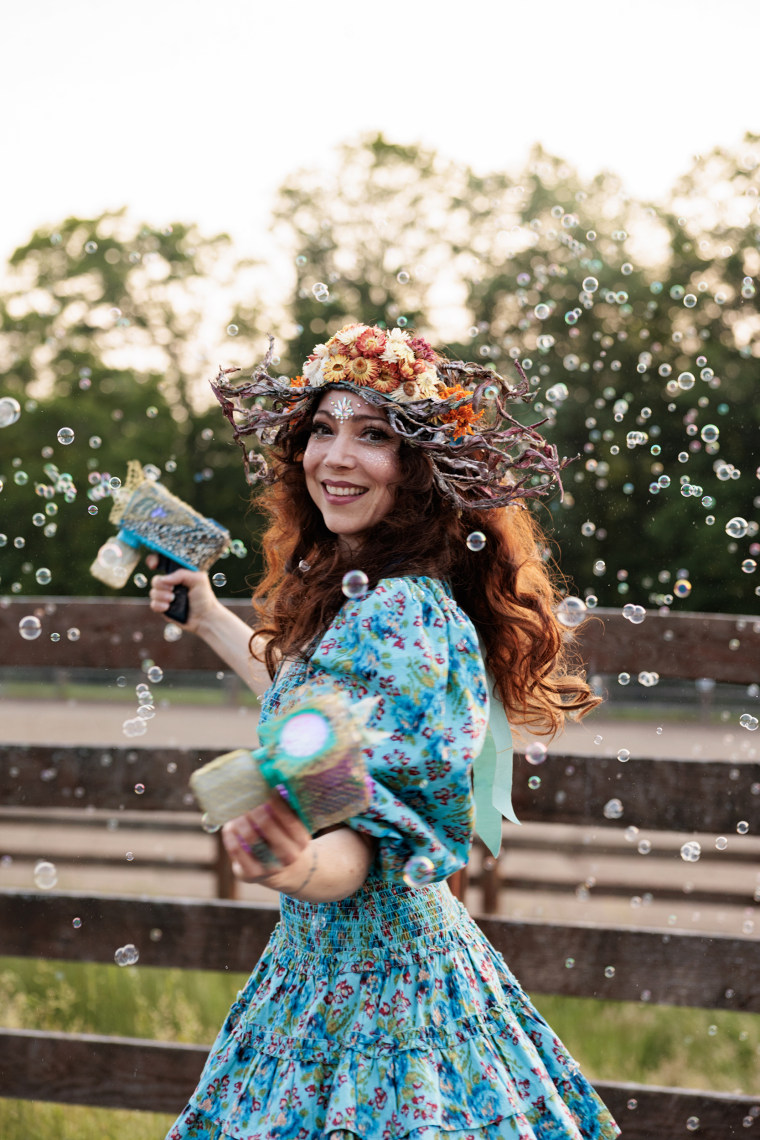
For Kindred, seeing her cabin mates at Breastival was one of the most special moments of the weekend.
“Hearing how nervous they were until now, seeing them really thriving … and really making their own experience (has been fun),” she says. “I ran into a few of them today and they’re all like, ‘This has been the best experience.’”

The next day, traces of glitter, pink and purple hair extensions and makeup served as a reminder of Breastival as people said goodbye. A bittersweet feeling hung over the camp as Breasties exchanged hugs and numbers and snapped one last photo.
Someone shouted there’s a “flattie” photo taking place, and women without breast reconstruction begin tearing off their shirts to join. Some sport tattoos across their chest while others have scars from their mastectomies.
There’s a second topless photo for anyone comfortable enough, and campers show off various breast reconstructions — some with nipple-sparing surgery, others with tattooed nipples and others without any.
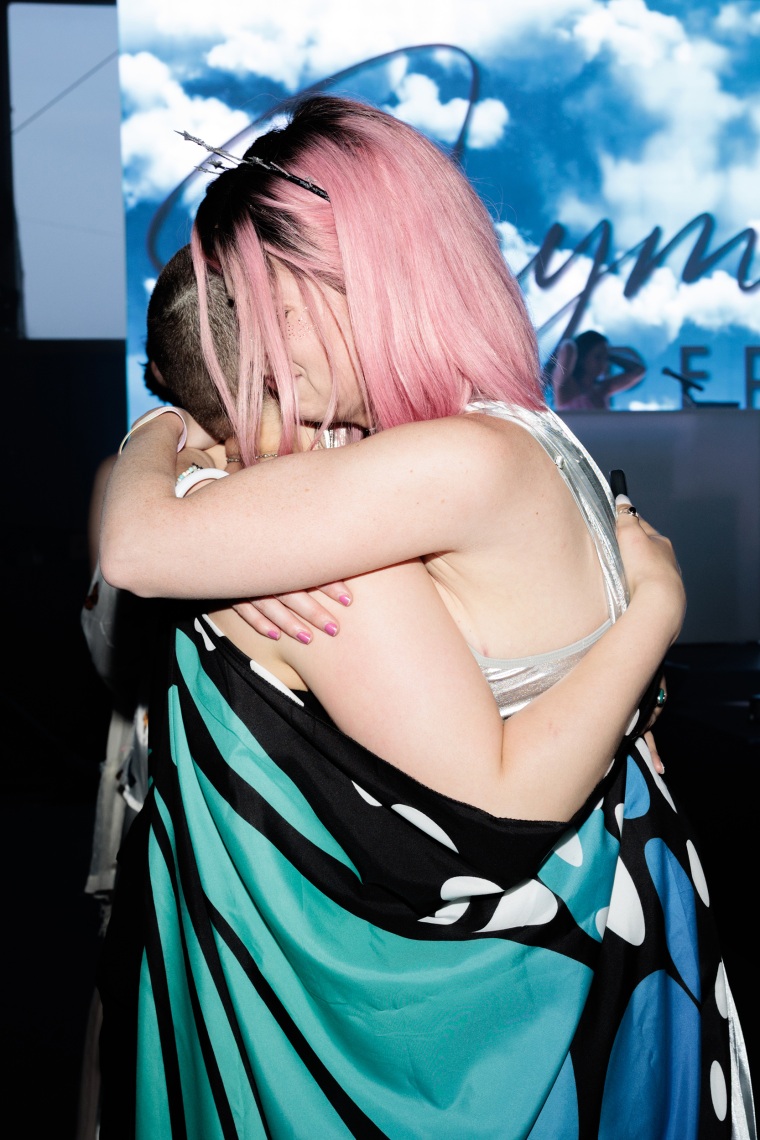
As the campers became subdued for the closing ceremony, the leadership team thanked everyone for another successful year.
“It is also your energy that makes this feel so good,” More said. “Our community is our North Star.”
